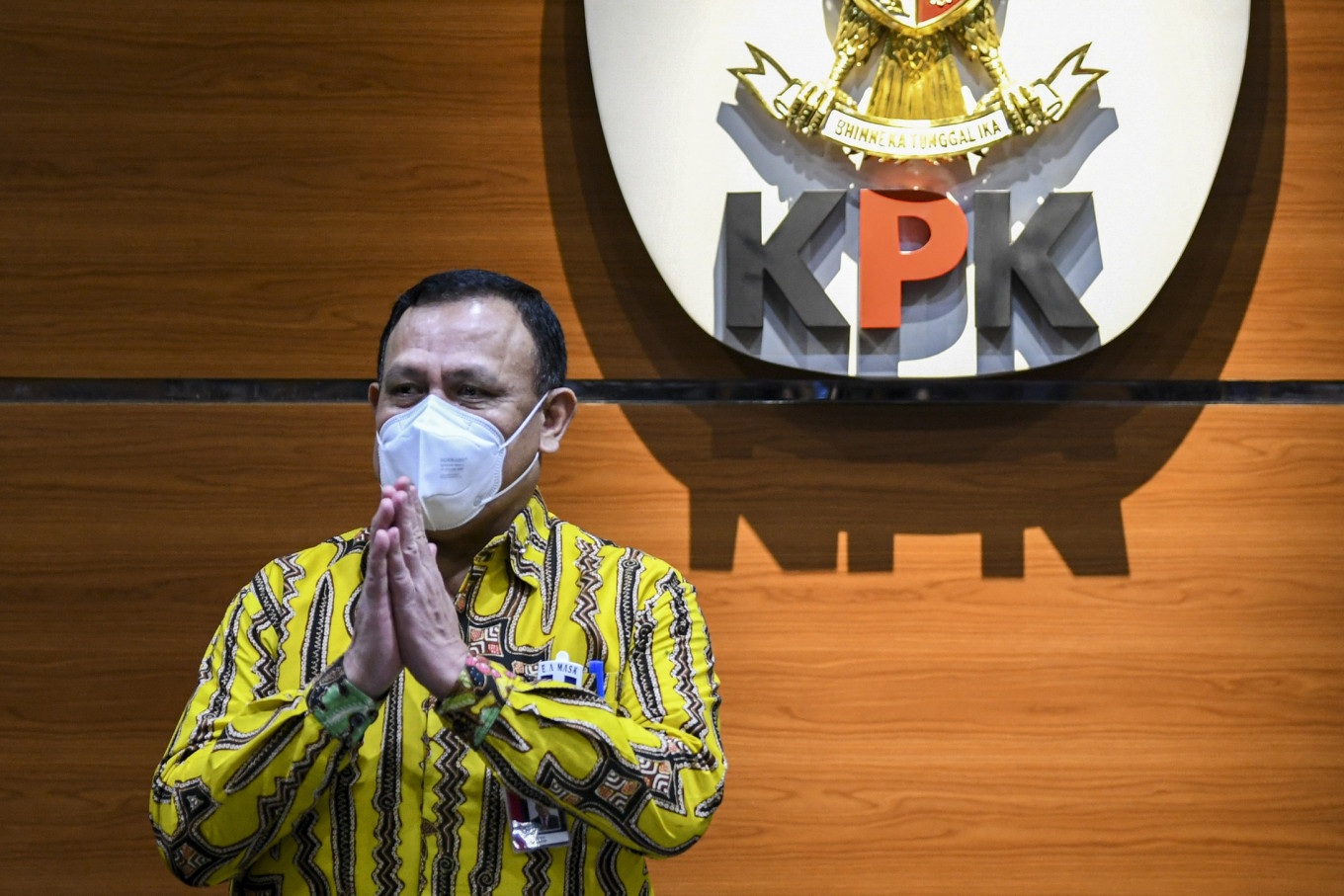Popular Reads
Top Results
Can't find what you're looking for?
View all search resultsPopular Reads
Top Results
Can't find what you're looking for?
View all search resultsObservers boo bloated KPK
“The fattening of this organizational structure is very problematic,” an Indonesia Corruption Watch (ICW) activist said.
Change text size
Gift Premium Articles
to Anyone
A
ctivists have criticized a decision by the Corruption Eradication Commission (KPK) to alter to its organizational structure and hire more employees, calling the move “fattening” and baseless.
On Nov. 6, the antigraft agency issued Regulation No. 7/2020 on the organizational and work procedures of the KPK, which created 19 new positions or departments and removed three existing ones.
KPK deputy commissioner Alexander Marwata said the restructuring took the current KPK leadership’s strategic plan into account.
“In principle, this structural development is to increase the effectiveness and efficiency of task execution,” Alexander said during a press conference on Thursday.
The move, he added, sought to adjust the development of the task function stipulated in Articles 6 and 7 of the 2019 KPK Law, which address preventing corruption, the treatment of perpetrators and the development of educational programs.
The 19 new positions and departments include a deputy head of education and community participation, a directorate of educational networks, a directorate of socialization and anticorruption campaigns, a directorate of community participation development, a directorate of anticorruption education and training and a secretariat for the deputy head of education and community participation.
They also include a directorate of anticorruption for business entities, a deputy head of coordination and supervision, a directorate of regional coordination and supervision for regions I to V and a secretariat for the deputy head of coordination and supervision.
Read also: University student suspended after reporting rector over alleged graft
The positions and departments also consist of a directorate of information management, a directorate of corruption detection and analysis, a group of special staff members, a center for strategic planning for corruption eradication and an inspectorate.
The three positions or departments removed were the deputy for internal supervision and public complaints, the directorate of internal supervision and the working unit for the anticorruption learning center (ACLC).
The newly established special staff will address five priority fields, namely information and technology, natural resources and the environment, international criminal and corporate law, management and human resources, as well as economics and business.
“The special staffers are taking over the advisory function. They are nonbinding and are hired as needed,” Alexander said.
The 2019 KPK Law, he said, did not mandate the establishment of KPK representative offices in regions, so the commission needed several regional coordinators for supervision. Internal supervision would be directly under top management control.
The drafting of the new regulation started in March, and the KPK discussed the provisions internally with employees in July, Alexander said.
The commission also discussed the new organizational structure and the changes to work procedures with the Administrative and Bureaucratic Reform Ministry and the Law and Human Rights Ministry, he added.
The new structure and procedures, he said, were prerequisites for the appointment of KPK employees as civil servants, as stipulated in Article 7 of Government Regulation No. 41/2020.
Read also: New regulation clarifies KPK supervision of police, AGO
“We will ensure that the filling of positions at the KPK will prioritize the principles of transparency, independence and accountability as before,” he said.
The new regulation received swift negative feedback from anticorruption activists.
Indonesia Corruption Watch (ICW) activist Lalola Easter said the legal basis for the new regulation was unclear because some divisions, including the inspectorate and special staff, were not listed in Article 26 of Law 19/2019.
In the revised law, Article 26 does not stipulate new posts other than a KPK supervisory board.
“The fattening of this organizational structure is very problematic. The KPK has again failed to carry out its trigger mechanism function,” Lalola told The Jakarta Post on Thursday.
ICW coordinator Adnan Topan Husodo said that regardless of the restructuring, the KPK had been paralyzed institutionally because of the revised law, as shown by the absence of raids and weaker law enforcement.
“No matter how slender or fat the structure, the main problem remains the regulatory changes that have killed the KPK’s strategic roles. The only consequence of a fat structure is that you need a bigger budget,” he said.










